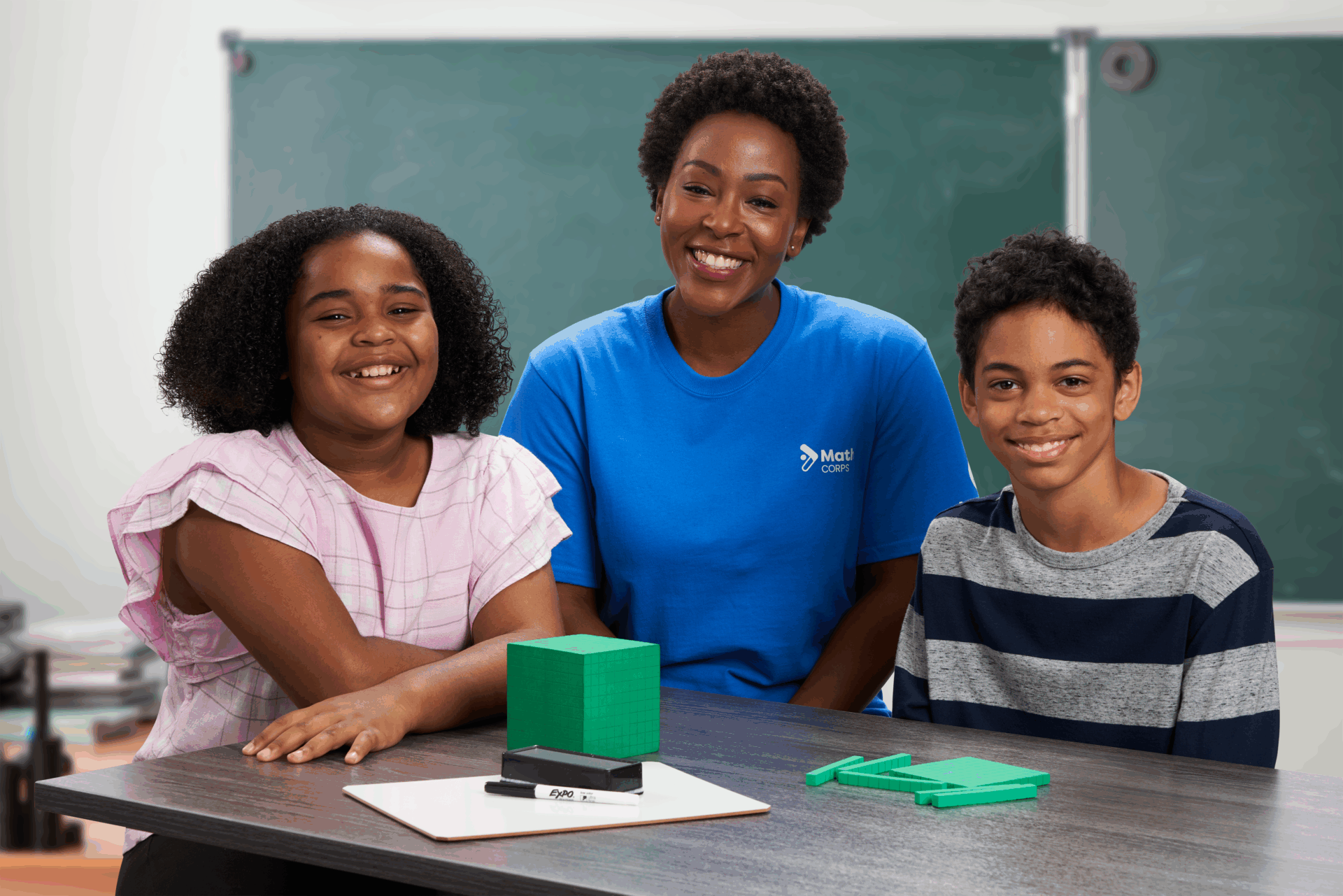What are the math skills that create a strong foundation for future success? In 2009, the Institute of Educational Sciences collected years of research and published their key recommendations for assisting students who needed greater math support. Based on these findings, Math Corps was designed to boost student success through targeted, effective interventions. Specifically, Math Corps Tutors help students master three core mathematical concepts. Each of these core concepts builds on the previous, starting with whole number understanding and rational number understanding, then algebraic reasoning.
Core Concept: Whole & Rational Number Understanding
Whole number understanding is just what it sounds like: knowledge of whole numbers like 0, 1, 2, and 3, as well as how the concept of numbers relates to the real world. Rational number understanding takes the idea of whole numbers and adds new types of numbers, like fractions, decimals, and negative numbers. Together, these concepts form the foundation of all math instruction, and an early understanding of them strongly predicts future math achievement.

“Research has shown that students who need extra support with math benefit from building their whole and rational number understanding skills,” says Angela Hall, Director of Math Corps. “These skills are crucial for future success in math and they allow students to better access their current math classroom instruction. That’s why they’re our key premises for tutoring.”
Core Concept: Algebraic Reasoning
While algebraic reasoning may remind many people of high school exams and “solving for x,” the concept is broad, and students begin to build the skills in elementary school. It starts with learning to recognize patterns, represent relationships, make generalizations, and analyze how things change. This type of abstract thinking is essential for success with math in high school and beyond.

Building Blocks for Math Proficiency
To support student growth, tutors are trained to use proven instructional strategies that focus on building conceptual understanding, computational proficiency, and word problem solving. Just like the core concepts, these strategies build on each other, and proficiency helps students succeed with material they are learning in class throughout the year.
Conceptual Understanding

In math, conceptual understanding means having a strong grasp of the mathematical ideas that allow students to make connections and apply their knowledge to problems. For younger students in Math Corps this begins with the awareness that abstract symbols like 1 and 2 represent the idea of having one or two tangible objects.
One of the ways Math Corps Tutors build conceptual understanding is using objects that students can see and touch, like blocks. For example, when solving 2 x 4, students can take blocks and make two groups of four, then add up the total to find the answer! Once students grasp the basic concept with objects, tutors then move on to things like pictures or drawings, and later on, just the number symbols themselves.
“These ideas act like scaffolding, allowing students to build deep conceptual understanding,” says Anne Sinclair, Chief Learning Officer.
Computational Proficiency
After building a strong understanding of the concepts behind math, students move on to developing computational proficiency, or the ability to solve problems accurately and efficiently. Tutors focus on helping students understand when and how to use different procedures to solve problems without getting bogged down.
One of the ways that tutors help students develop skills like computational proficiency is the explicit instruction model, which progresses in three steps. First, tutors show students how to do something by doing it themselves. Second, the tutor and student do that strategy together. And finally, the students do it independently, with the tutor observing, ready to help if needed. This kind of instruction includes multiple opportunities to practice and give corrective feedback, which research has shown strengthens students’ abilities.
Word Problem Solving
Lastly, Math Corps’ strategy focuses on helping students apply math skills to real-life situations by solving word problems. Tutoring sessions use a variety of techniques and methods for helping students tackle word problems, all of which are based on years of research. While success in the classroom and on exams is a major goal of tutoring, the program has been designed to use examples that are relevant to the experiences of students. This way students are better prepared to use math not just in school, but also in their everyday lives.
“Math Corps students that develop a deep understanding of the key foundational math concepts benefit more fully from classroom math instruction,” says Hall. “Then they can successfully apply these skills in other academic areas and in everyday life, now and in the future.”
Knowledge that Boosts Achievement
Math Corps focuses on whole and rational number understanding and algebraic reasoning because science shows that these concepts are the foundation of math ability and success. The Department of Education’s most recent National Report Card showed that fewer than 40% of fourth graders and 30% of eighth graders are proficient in math. However, Math Corps is helping to change that.
A recent study from Accelerate measured the efficiency of different high-dosage tutoring programs. According to their analysis, Math Corps was the single most efficient program of those studied. To gain the equivalent of one month of learning, Math Corps students needed 6 hours of tutoring, meaning the program is more than twice as efficient as the average program!

To read about the numerous studies on Math Corps impact, visit our partners at the National Service and Science Collaboration. Find out how you can bring Math Tutors to your school or how to become a tutor yourself by visiting readingandmath.org/programs/math-corps.
